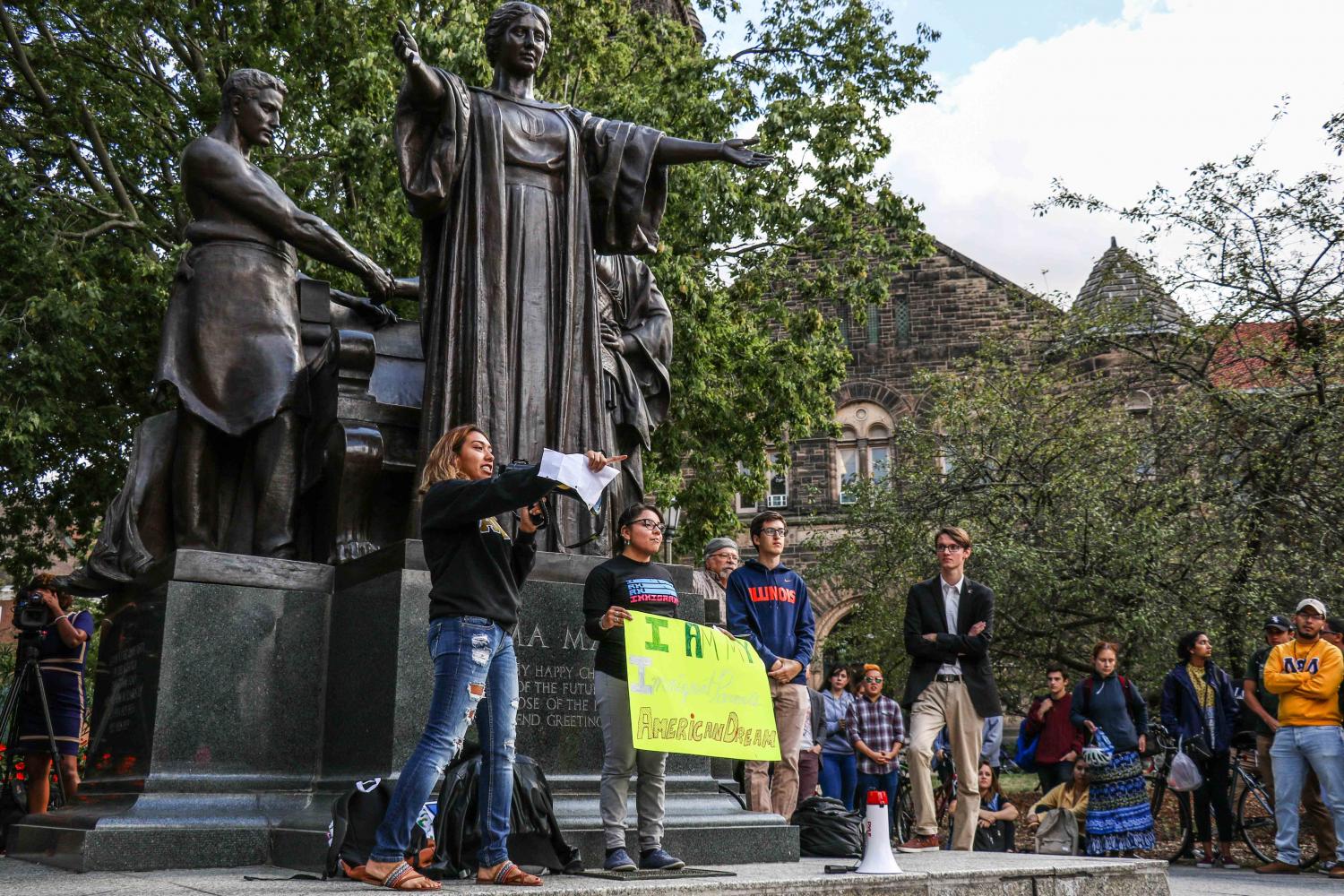Campus political groups react to DACA
A student speaks to crowds in front of Alma Mater gathering to protest President Trump’s decision to end the Deferred Action for Childhood Arrivals (DACA) earlier this year.
Sep 28, 2017
On Sept. 14, it was reported that President Trump is working with the Democratic Party to pass a resolution to Deferred Action for Childhood Arrivals into law in the next six months.
This is the newest attempt by the government to reach across the aisle in its decision making. Campus political organizations are mirroring these attempts in the pursuit of better communication.
Jack Johnson, sophomore in Engineering and vice president of Illini Republicans, supports the president’s decision.
“I voted for Trump, and I don’t regret it now,” Johnson said. “I’m glad he’s looking for bipartisanship… if [members of congress] don’t learn to work together I don’t think anything’s gonna happen on either side.”
Anusha Thotakura, president of Illini Democrats, also agrees with the decision to help DACA recipients, but she didn’t share Johnson’s compliments.
Get The Daily Illini in your inbox!
“I think it says more about the political pressure that he’s been put under right now. To work for DACA because DACA has popular support, it has around 70 percent support across the country,” Thotakura said.
According to the PEW Research Center, 11 million undocumented immigrants are currently living in the U.S.
“A lot of the Republicans in favor of anti-immigration, in favor of deporting all illegal immigrants in this country actually support DACA because DACA recipients pay taxes, they contribute the the country, to the economy in a variety of ways,” Thotakura said.
Johnson said he believes that DACA will not have a future, even in light of Trump’s efforts in the other direction. He said he feels that DACA was an executive overreach by President Obama and referred to it as “a reward for people cutting in line.”
“DACA won’t survive in its full form – there’s no way the very heavily republican house is going to go for that,” he said.
The Illini Democrats and Illini Republicans have not officially interacted since last year’s polarizing presidential election.
“We haven’t interacted with [Democrats] a whole lot since the last election cycle… they kinda withdrew, we normally have debates annually or every semester, however the last year or so they haven’t wanted to do that,” Johnson said. “It was a contentious election and I can see why some of their members would behave that way.”
Thotakura said that the debate in spring semester didn’t happen because of the chalking incident in April. She added that considering the pressure and stress caused by the controversy, the Democrats decided not to debate the Republicans that semester.
“I know some (Democrats) … and they seem like fine people. I wish both groups could communicate a little more,” Johnson said.
Raneem Shamseldin, senior in the College of Business and president of Illinois Student Government, however, said that the “chalking” scandal wasn’t relevant.
“I think it was just tension between the two parties led to a lack of a debate,” she said. “The chalking is a completely different topic.”
However, both organizations are under new leadership as of September and are currently planning another debate. The proposal for this semester’s Republican-Democrat debate was an item on Wednesday’s agenda at the ISG meeting.
Spencer Haydary, senior in LAS and chief of staff of ISG, is optimistic about this year’s debate.
“I think it’ll definitely happen,” he said. “I know that both organizations really want to debate each other, and since this event will promote political engagement and efficacy on campus in the bi-partisan way, I think it’s a fantastic allocation of resources.”
The ISG will most likely sponsor the event, according to Haydary.
“I’m very in favor of debates because they provoke conversations… so I am in support of the resolution as it stands,” Shamseldin said.






